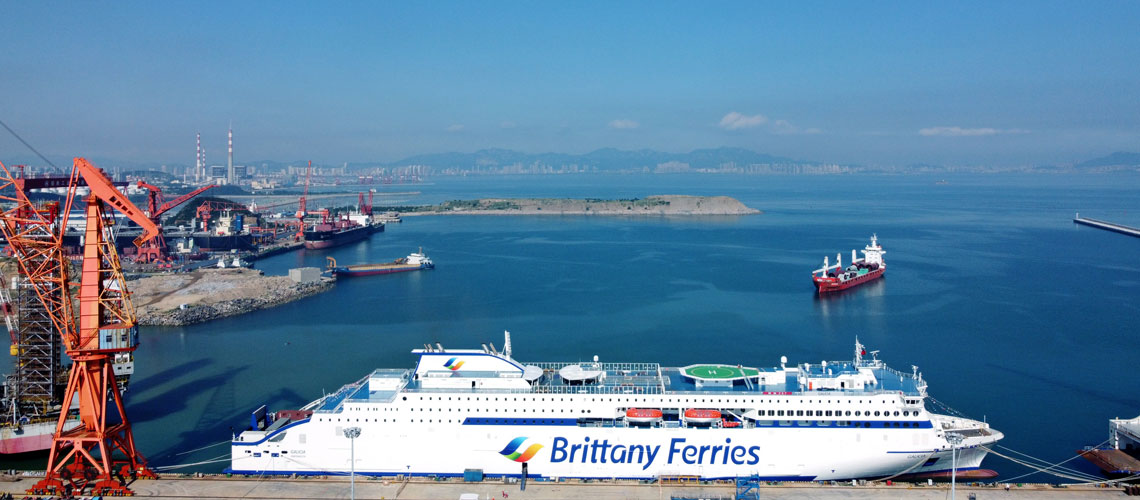
Published
- Sustainability
- Financing
Smooth ferry leasing secured
A novel guarantee construction from EKN brings a new class of energy-efficient and environmentally adapted ferries to international waters as passenger traffic is set to bounce back in the wake of eased travel restrictions.
Swedish shipping group Stena has pioneered the development of new marine RoRo, cargo and passenger concepts, specialising in custom-built as well as standardised vessels, usually built at Chinese shipyard CMI Jinling in Wenhai. The company leases about fifteen vessels to operators worldwide, both to other Stena companies and third parties.
Three ferries are currently chartered on 10-year contracts to French-owned Brittany Ferries. When the company approached Stena with a desire to charter two additional ferries of the E-Flexer class, Stena turned to EKN in order to reduce its financial risk.
Stena Group Finance Director Peter Claesson notes that company policy aims to ensure that risk exposure vis-à-vis individual clients doesn’t exceed certain levels. “We are delighted to work with professional and proactive shipping companies like Brittany Ferries, with whom we enjoy a smooth and rewarding cooperation,” he says and adds, “Sheer financial prudence, however, requires us to avoid concentrated risk exposure towards one single counterpart.”
Two additional 10-year charters would bring the total charter commitment of Brittany Ferries to approximately USD 500 million. To diversify its risk exposure, Stena therefore turned to EKN for advice.
“Given that this is a form of export of services, we would be able to issue a guarantee against losses on long-term claims with Stena as beneficiary,” says Pär Granlund, Senior Underwriter.
There was a challenge, however, in that the OECD stipulates that export credit guarantees extending beyond a certain period of time (2 years) must be accompanied by a down payment of 15 percent of the contract value. Since down payments of charter fees are virtually unheard of in the shipping industry – and the lease contract had already been signed – the transaction was not compliant with the OECD Arrangement.
High residual value
The magic wand that proved able to untie the knot is spelled residual value. Each ship costs around USD 150 million and Brittany Ferries has the option of purchasing the chartered vessels after five, seven or ten years. The residual value of the ships was estimated as high enough to justify the transaction being classified as an operational lease, and thus forego the need for down payment.
The new classification, as well as the long economic life of the ships, made it necessary for EKN to reformulate the guarantee conditions of what is normally a standard product.
Theoretically, should the charterer fail to uphold its contractual obligations and EKN therefore must compensate Stena according to the guarantee, the reformulated terms still offer EKN the possibility to recover some or a relatively large stake of its losses, if and when Stena manages to charter the vessel to another shipping company.
“To arrive at a solution that was acceptable to both the guarantee holder and its client, we put a considerable effort into reformulating the guarantee terms,” says Granlund.
“It was quite a challenge,” confirms Claesson, “But EKN was constructive and creative in formulating terms that were in line with external policies without requiring a down payment on the leasing fee from the leaseholder. EKN has been extremely flexible in a way that is not often seen in the government sector.”
In terms of risk, Granlund notes that the current Covid-19 situation proved another challenge, as tourism and passenger ferry traffic declined both rapidly and sharply, which of course affected Brittany Ferries. “EKN found comfort, however, in Brittany Ferries’ track record, Stena’s expertise and credibility as well as the support from the French government to Brittany Ferries.”
In terms of sustainability, the new breed of ferries represented by Stena’s E-Flexer vessels are energy-efficient and flexible in being prepared for tomorrow’s carbon-free transportation sector. They are presently designed to run on LNG, which considerably reduces particle emissions compared with diesel engines and also paves the way for completely fossil-free propulsion once this is commercially viable.
Featured with the option of battery-electric operations when in ports and even during manoeuvring in and out of ports, the E-Flexer ferries promise to contribute to better air quality when moored.
